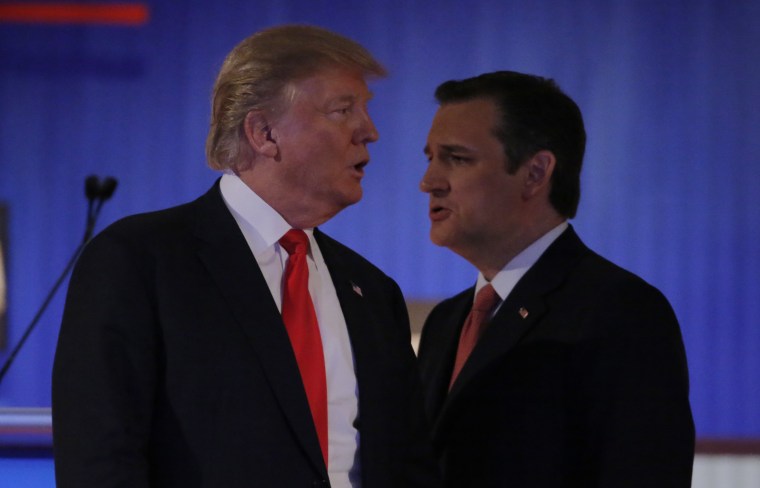FARGO, N.D. — Sen. Ted Cruz's campaign has identified its preferred slate of North Dakota delegates to the Republican National Convention, setting up a clash with Donald Trump supporters in a vote for the state's delegates Sunday afternoon.
It was a move to lock down early supporters as the three remaining candidates — Trump, Cruz and Ohio Gov. John Kasich — maneuver to gather delegates in case of the increasingly likely outcome of a brokered convention, where no candidate enters the convention with a majority of delegates.
That would make North Dakota's 25 delegates highly valuable — all remain free agents and can vote for whomever they please at the national convention in July, potentially sending a candidate close to a majority over the edge.
RELATED: Behind closed doors in North Dakota, Carson makes his pitch for Trump
State party officials on Saturday released a list of 25 recommended delegates to the convention, compiled from the 112 applicants by weighing each one's contributions to the party, experience in local elected office and past delegate experience, among other things.
The Trump campaign on Saturday said it "loved" the proposed slate and believed as many as half of the delegates would be on their side once the final vote was tallied. Kasich's team at the convention also said it was fine with the party slate.
But the Cruz campaign went one step further to ensure North Dakota's slate of delegates is favorable to the candidate by passing out a piece of paper with a list of 23 people it identified as supporters, asking delegates to vote for them.
"Senator Cruz appreciates all of his supporters at the convention, but he asks you to focus your votes on this group due to the necessities of unifying our votes," the Cruz slate reads.
There was some overlap with the slate proposed by party officials and some openly admit they're still undecided.
Dick Dever, a state senator who appeared on both the party slate and Cruz's proposed slate, said Saturday night he leaned more towards Kasich, but that "the verdict is still out" on who to support — and he could "possibly" decide on the day of the convention.
Trump delegate wranglers roaming the convention privately speculated that the Cruz campaign simply printed a slate for optics, to ensure the story coming out of the convention focused on how many delegates Cruz won over others.
RELATED: Trump campaign alleges ‘theft’ as Tenn. GOP picks delegates
But it was the latest example of how intense the fight over delegates has become as the GOP primary fight continues to drag out into the spring, with no clear end in sight and an outright winner increasingly unlikely.
With that in mind, Cruz, Trump and Kasich's campaigns have been lobbying delegates all weekend for their support. Cruz appeared at the convention on Saturday, pitching himself as the most electable candidate in the race, while Trump sent former GOP presidential candidate Ben Carson to act as his surrogate, meeting with delegates one-on-one on Saturday and speaking on his behalf on Sunday. Kasich sent former New Hampshire Sen. Gordon Humphrey to tout his cause.
The delegate battle has become so pitched that the typically sleepy North Dakota GOP convention briefly erupted into chaos Sunday as delegates debated over whether to require their national convention delegates identify their loyalties before the vote.
The convention floor, where all 1,600 delegates sit in neat rows by district, filled with whispers and murmurs as as some stood to speak forcefully in favor or against the motion.
One party activist urged delegates to identify who they're backing, and warned of possible "fisticuffs" at the convention.
South Dakota GOP Chairman Kelly Armstrong called a voice vote in favor of the opposition, prompting loud boos from across the convention floor. Delegates then took a standing vote, which he again called in favor of the opposition, sparking shouts from the crowd of "call the roll!"
Finally, the motion failed in a roll call vote, and the convention resumed with normal party business. Curly Haugland, North Dakota's national committeeman, said allowing the delegates to keep their preferences private was necessary for civility.
"The reason for secrecy is so neighbors can sit next to one another and vote and not have to be enemies forever," he said.
And he warned that if delegates' loyalties do become public at the national convention, the whole operation could devolve into nastiness.
"There's no way to know who voted how and that's for good reason — so you're not subject to threats, intimidation and coercion, since that's whats gonna happen if people get named and identified," Haugland said.
This story first appeared on NBCNews.com.
